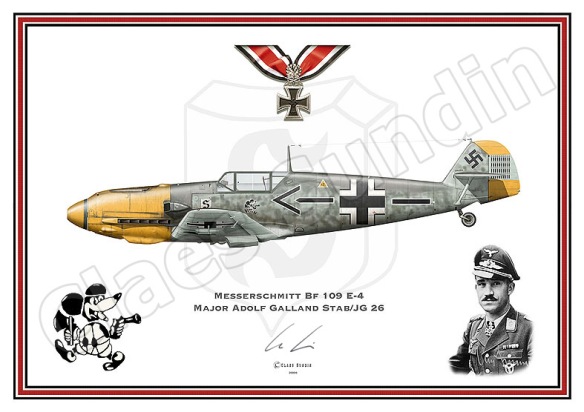COLONEL GALLAND
The first fact was that the RAF losses we reported were from time to time overestimated. And our High Command made the mistake of discounting all these losses from the inventory of the RAF, and very soon there came these negative figures. Secondly we were confronted very soon by the British fighter-control system based on radar, which we didn’t have at the time, and this radar system and fighter control were very effective. The next argument can be used that the defence on central lines is easier than attack from a wide radius. The defence took place over their territory and we had the Channel with a lot of water in it between our bases and the targets. Secondly our range was very limited and could only cover a small part of the British Isles, including London. But over London we could only stay for ten minutes to come back to our bases. So this limited range of our fighters, the escort, was perhaps the main point which prevented an effective air offensive against Britain. Without any doubt the British fighter pilots fighting over England defending their own country showed extreme bravery, and their experience was very high: their morale, and the material performance of their fighters was about equal to ours.
SERGEANT PILOT RAY HOLMES
504 Squadron RAF
I think we were just getting on with the war as one would play a game of rugby or cricket – to win. That was all and if you just played your hardest the other man had to come down. I don’t think there was any worry about losing at all – we were out to win.
WING COMMANDER AITKEN
Although there were a lot of aircraft about suddenly, when you were fighting a particular man, him in his machine and you in your machine, the sky became empty and you didn’t see anyone else, you saw nothing except this one man you were trying to shoot down and he was trying to shoot you. It was just one against one and sometimes you knew he was very good, sometimes you knew he wasn’t so good and so you could assess the situation fairly closely as to whether he might be lucky to hit you but otherwise you can get him.
SERGEANT PILOT HOLMES
We used to say we must shoot down these German bastards and I think we built up a sort of synthetic hate against them, but I think it was a bit artificial. We were after the aeroplanes, at least personally that was my view. I wanted to shoot an aeroplane down but I didn’t want to shoot a German down, I really did not. We did hear stories of Germans shooting at our fellows in parachutes and we thought that was pretty horrible, but we weren’t sure whether it was true or not. I know I had an experience of a German aircrew getting draped over my own wing; he baled out of a bomber and got caught on my wing with his parachute and I was jolly careful to get him off as easily and as quickly as I could by banking the aeroplane and shaking him off. I was very glad when I heard he’d dropped down in Kennington Oval safely. So I had no feeling of wanting to kill that fellow personally.
WING COMMANDER AITKEN
I’d say there was no chivalry at all – you mean between the German Air Force and the British? I’d say absolutely none at all, not as far as I was concerned. I hated them, they were trying to do something to us, to enslave us, and I wasn’t going to have anything of that if I could possibly avoid it. I would say there was none, but I know there seems to be some of it about now, these days. But not from me – never.
SERGEANT PILOT HOLMES
I don’t think anyone ever considered that he would be killed, that was something which was just put at the back of your mind. If it was not, then you’d have got the jitters and have been very worried. If a fellow did go missing it was just, ‘poor old so-and-so’s had it’ and that was that. Inwardly of course you’d feel it tremendously if you lost a pal but you didn’t dwell on the subject at all. It couldn’t happen to you.
